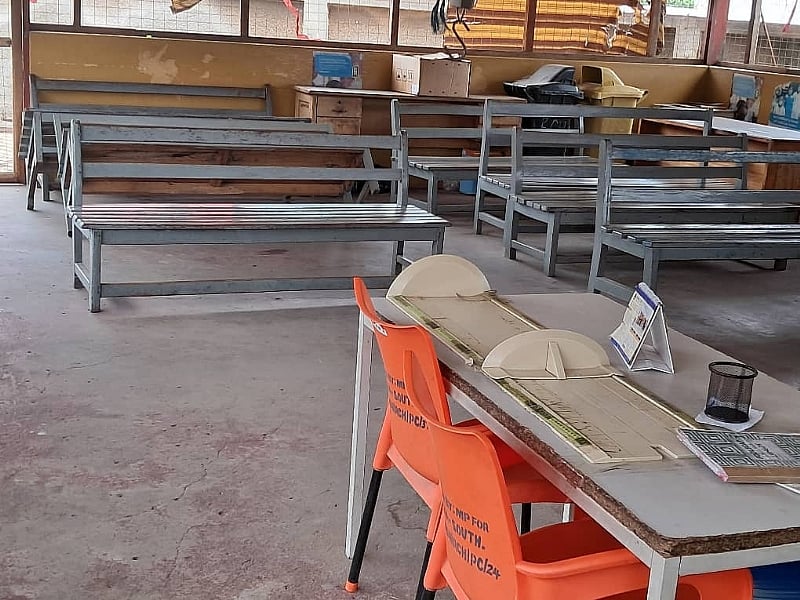The ongoing strike by members of the Ghana Registered Nurses and Midwives Association (GRNMA) has plunged healthcare services across Ghana into a state of crisis, leaving patients stranded and vulnerable. Major hospitals, particularly in the Ashanti Region, are grappling with severe disruptions. Facilities like Manhyia, South Suntreso, and Kumasi South Hospitals are operating at significantly reduced capacity, with key departments such as family planning and specialized clinics at Manhyia Hospital completely shut down. Red bands tied at the entrances of these facilities serve as stark reminders of the ongoing industrial action and the resulting paralysis in healthcare delivery. The absence of nurses and midwives has placed an immense strain on the remaining medical staff, forcing doctors and house officers to shoulder an overwhelming patient load, a situation described as challenging by Dr. Adu Boakye, Deputy Chief Medical Officer at Manhyia Government Hospital. The nationwide impact of the strike underscores the urgent need for a resolution between the GRNMA and the government to avert a further deterioration of healthcare services.
The strike’s ripple effect is being felt across various regions, including the Volta Region, where physician assistants have stepped in to manage the Outpatient Department (OPD) at the Volta Regional Hospital in Hohoe. These physician assistants are now performing essential tasks such as checking patients’ vital signs – duties typically performed by nurses. This highlights the strain on alternative healthcare providers and the potential for compromised care due to the absence of specialized nursing staff. Courage Kumah, Regional Chair of the GRNMA in the Volta Region, emphasized the urgency of the situation, calling on the government to prioritize the welfare of nurses and address their conditions of service as the key to resolving the impasse. He confirmed the full commencement of the strike across the region and cautioned against deploying unauthorized personnel to provide patient care, citing potential risks to public health and safety.
The core issue fueling the GRNMA’s strike is the demand for improved conditions of service. Nurses and midwives are seeking better compensation, enhanced working conditions, and recognition of their crucial role in the healthcare system. The prolonged negotiations and the government’s apparent inability to meet the GRNMA’s demands have led to the current impasse, jeopardizing healthcare delivery nationwide. The closure of key departments and the reduced capacity of hospitals to provide essential services highlight the critical role nurses and midwives play in the healthcare ecosystem. Their absence creates a void that cannot be easily filled, placing immense pressure on the remaining medical staff and compromising patient care.
The strike’s impact on patients is particularly concerning. Delays in treatment, limited access to specialized care, and the overall uncertainty surrounding the resumption of full services are causing anxiety and hardship for those seeking medical attention. The disruption of essential services like family planning further underscores the far-reaching consequences of the strike on public health. The government’s delayed response and the lack of a clear roadmap towards a resolution are exacerbating the situation, leaving patients in limbo and raising concerns about the long-term implications for healthcare access and quality.
The deployment of physician assistants and other non-nursing staff to fill the gaps created by the strike is a temporary measure that cannot adequately address the complex needs of patients. While these individuals provide essential stop-gap support, they lack the specialized training and experience of nurses and midwives, potentially compromising the quality of care. Furthermore, concerns raised by Mr. Kumah regarding unauthorized personnel attending to patients highlight the potential risks associated with deploying unqualified individuals in critical healthcare roles. This underscores the importance of resolving the strike swiftly to ensure the delivery of safe and effective healthcare services by qualified professionals.
The GRNMA’s strike underscores the broader challenges facing Ghana’s healthcare system. The ongoing dispute highlights the need for a comprehensive review of healthcare worker compensation, working conditions, and career progression pathways. Investing in the healthcare workforce, ensuring adequate staffing levels, and providing a supportive work environment are essential for attracting and retaining skilled professionals and ensuring the long-term sustainability of the healthcare system. The current crisis underscores the need for proactive engagement between the government and healthcare unions to address grievances, prevent future industrial actions, and build a stronger, more resilient healthcare system that can effectively serve the needs of the Ghanaian population.














